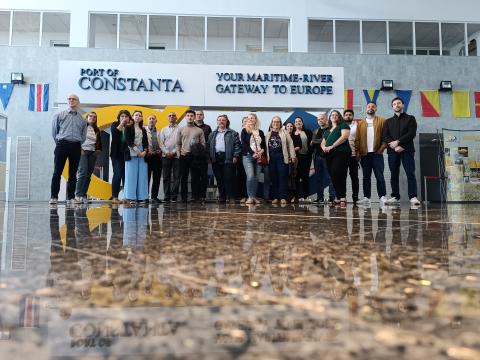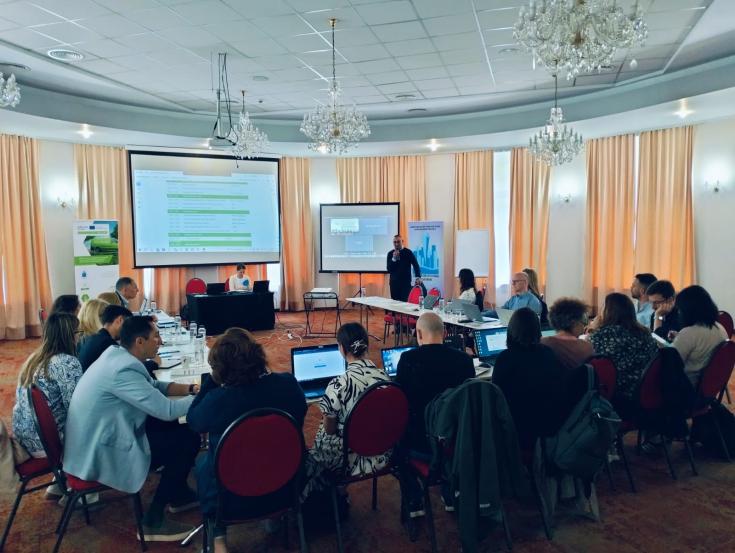SPOTLOG 4th Exchange of Experience Event held in Romania
The SPOTLOG 4th Main Interregional Exchange of Experience Event was held in Constanta, Romania, between May 28th and 29th. The two-day event was intense in sharing experiences and discussions to foster more sustainable last-mile deliveries, bringing together project partners, stakeholders, and experts to discuss innovative solutions for sustainable urban logistics, involving 46 in-person participants, and 8 online.
The event began with a warm welcome from George Lupasco, representing the host partner, Constanta Metropolitan Zone (TMZ), who established a collaborative and productive tone for the subsequent discussions. Jorge Bandeira from the University of Aveiro, SPOTLOG lead partner, presented a comprehensive overview of the SPOTLOG project's goals as well as the findings of the sustainable last-mile delivery indicator analysis. The next set of communications were a major contribution to the learning process. Invited speaker George Mega provided valuable insights into the role of the Constanta Port on the Black Sea, emphasising its strategic importance for regional logistics and potential for sustainable growth, sparking lively discussions in a World Café session.
The day continued with a series of insightful presentations bringing the interconnectedness and potential synergies among various stakeholders in the urban logistics ecosystem. Stakeholder Mobility Rentals invited by Smart Cities Romania introduced the Universal Swappable Battery, a game-changing strategy for promoting low-carbon urban transport by making it easy to swap out depleted batteries in electric vehicles for charged ones. This innovation is directly relevant to the needs of companies such as Xicos, which presented their success story in transforming last-mile delivery in low-density, small cities, and inner regions of Portugal. By implementing swappable battery technology, delivery companies can increase the range of their electric vehicles, improve operational efficiency, and contribute to decarbonisation.
Another key synergy emerged between Mazovia Energy Agency's presentations and the consultant from Rebles, a Mechelen stakeholder. Mazovia's smart tools platform for urban logistics, which includes AI-driven traffic optimisation and a robust cargo search platform, could complement Rebles' digital platform. Timo Raino from TAMK shared their vision related to the features of new technologies and presented projects on smart city digital twin tools that can be very relevant for improving the logistics ecosystem. Cities and regions could create a comprehensive system for optimising logistics networks, improving communication throughout the supply chain, and enabling data-driven decision-making by combining these solutions. inBlenda focused their contribution on exploring the potential of improving smart city logistics through resource sharing, driven by e-commerce growth, rising costs, and environmental concerns, logistics need to optimise resources and meet fast delivery expectations efficiently.
The presentations by Xicos, Videzeme Planning Region in collaboration with the University of Riga, and Rimini Municipality added to the discussion by demonstrating real-world examples of sustainable urban logistics practices. Xicos' success story in transforming last-mile delivery in low-density areas aligned with Videzeme and the University of Riga's 15-minute City Concept, which focuses the importance of proximity and local networks in reducing transportation distances and emissions. Meanwhile, Rimini's Sustainable Urban Mobility Plan (SUMP) and Sustainable Urban Logistics Plan (SULP) established a comprehensive framework for incorporating sustainable practices into urban planning, serving as a model for other cities and regions.
The day ended with an internal steering group meeting coordinated by Eloisa Macedo from the University of Aveiro.

The second day of the event featured a study visit to the Port of Constanta, where participants got a firsthand look at the port's operations and infrastructure, emphasising the importance of efficient logistics hubs in the supply chain. A guided walking tour in the afternoon provided additional exploration and networking opportunities.
Overall, the 4th Main Interregional Exchange of Experience Event in Constanta was an important moment towards policy improvement, demonstrating the challenges but also some inspiring opportunities behind the urban logistics ecosystem and exploring the potential for collaboration and innovation among diverse stakeholders to achieve a more sustainable and efficient future for urban freight transport.
